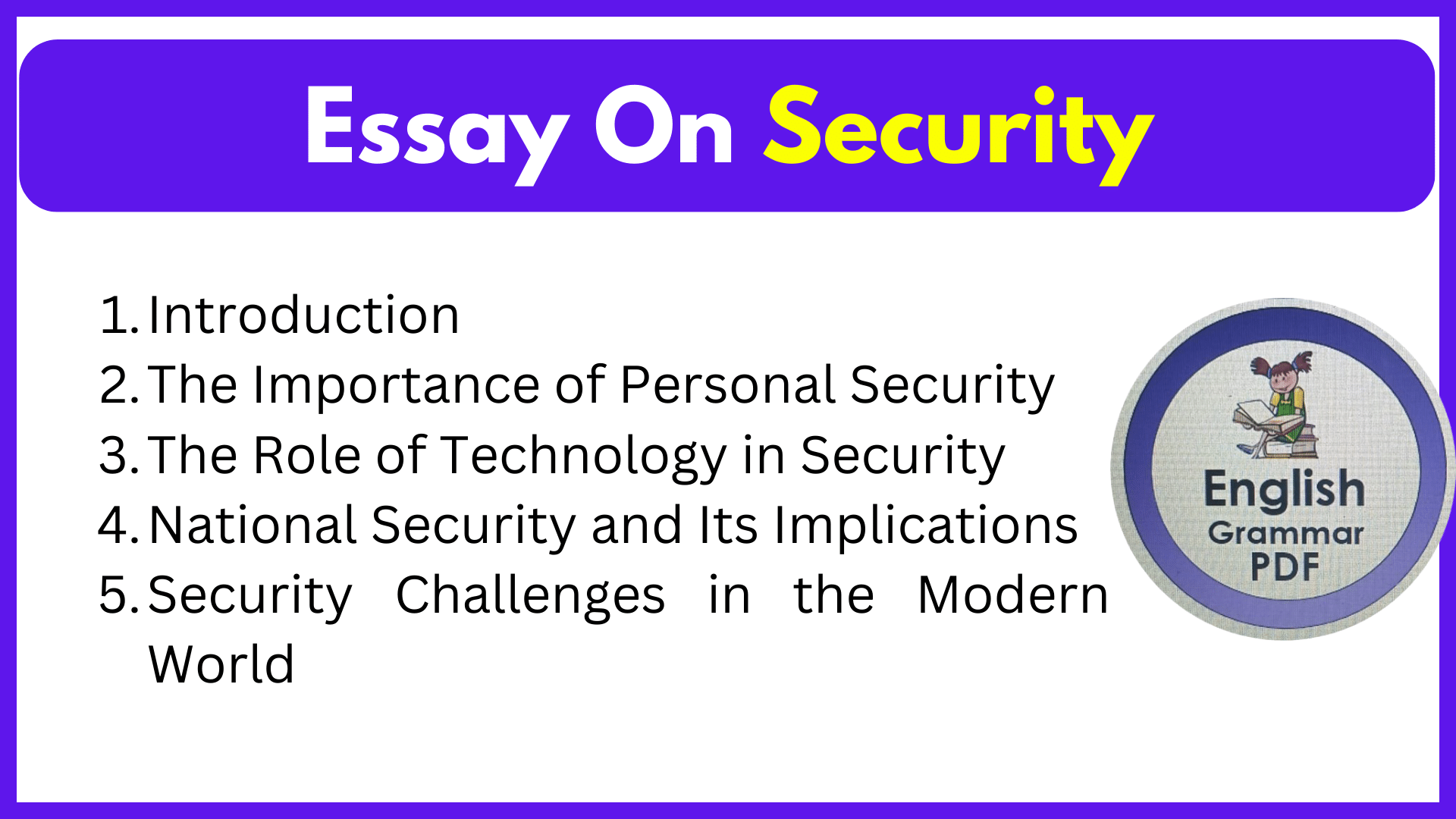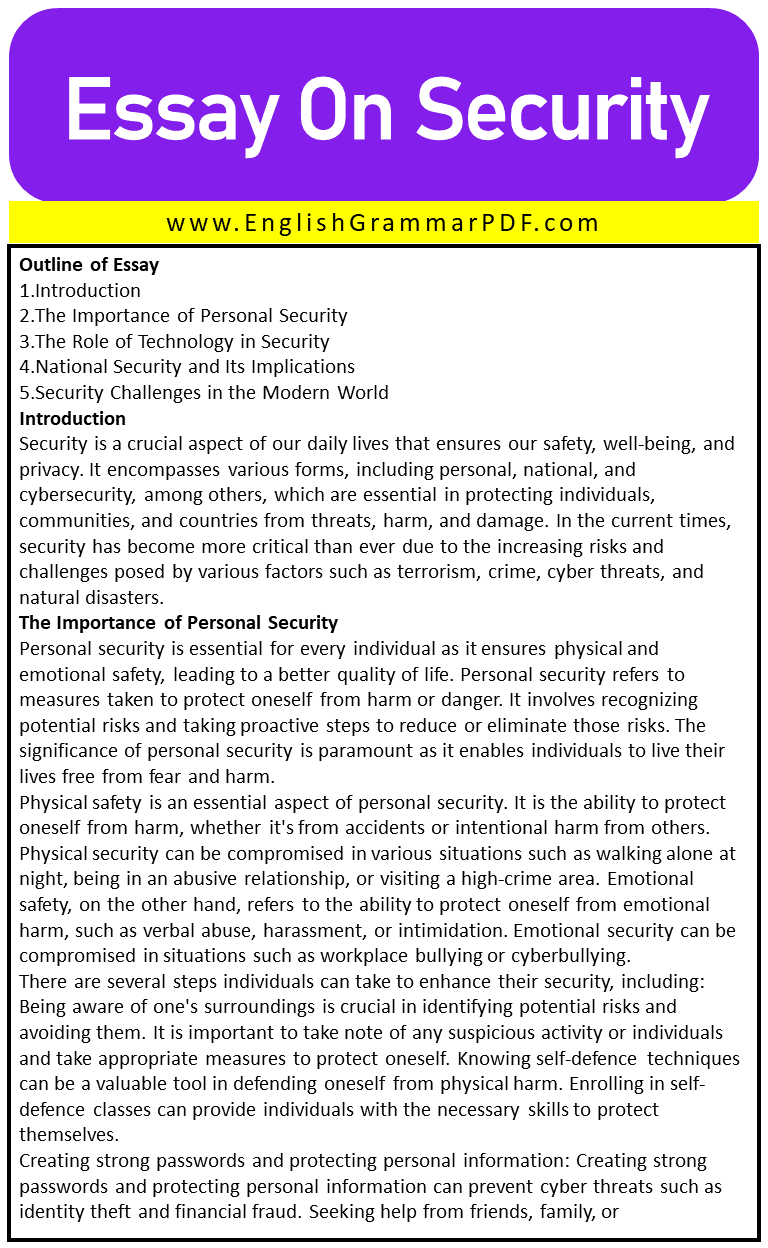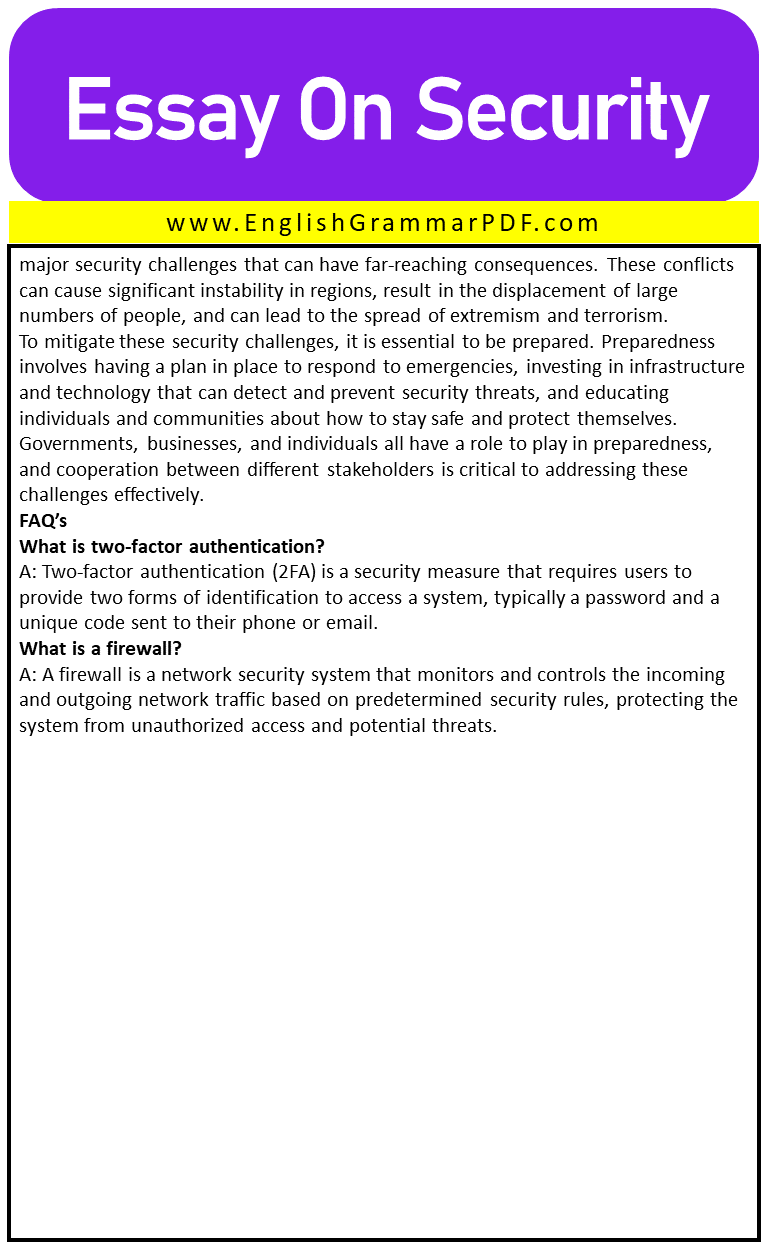Essay On Security
Outline of Essay
- Introduction
- The Importance of Personal Security
- The Role of Technology in Security
- National Security and Its Implications
- Security Challenges in the Modern World
Introduction
Security is a crucial aspect of our daily lives that ensures our safety, well-being, and privacy. It encompasses various forms, including personal, national, and cybersecurity, among others, which are essential in protecting individuals, communities, and countries from threats, harm, and damage. In the current times, security has become more critical than ever due to the increasing risks and challenges posed by various factors such as terrorism, crime, cyber threats, and natural disasters.
The Importance of Personal Security
Personal security is essential for every individual as it ensures physical and emotional safety, leading to a better quality of life. Personal security refers to measures taken to protect oneself from harm or danger. It involves recognizing potential risks and taking proactive steps to reduce or eliminate those risks. The significance of personal security is paramount as it enables individuals to live their lives free from fear and harm.
Physical safety is an essential aspect of personal security. It is the ability to protect oneself from harm, whether it’s from accidents or intentional harm from others. Physical security can be compromised in various situations such as walking alone at night, being in an abusive relationship, or visiting a high-crime area. Emotional safety, on the other hand, refers to the ability to protect oneself from emotional harm, such as verbal abuse, harassment, or intimidation. Emotional security can be compromised in situations such as workplace bullying or cyberbullying.
There are several steps individuals can take to enhance their security, including:
Being aware of one’s surroundings is crucial in identifying potential risks and avoiding them. It is important to take note of any suspicious activity or individuals and take appropriate measures to protect oneself. Knowing self-defence techniques can be a valuable tool in defending oneself from physical harm. Enrolling in self-defence classes can provide individuals with the necessary skills to protect themselves.
Creating strong passwords and protecting personal information: Creating strong passwords and protecting personal information can prevent cyber threats such as identity theft and financial fraud. Seeking help from friends, family, or professionals can be essential in addressing personal security concerns. In situations such as domestic violence or workplace bullying, seeking help can provide a safe and supportive environment.
The Role of Technology in Security
Technology has revolutionized security in the modern world in several ways. It has transformed the way we approach security, from physical security to digital security. Technology has enabled us to create innovative solutions that are more efficient, effective, and proactive in preventing threats.
One of the most significant benefits of technology in security is the ability to enhance personal security. For example, wearable devices such as fitness trackers can monitor and alert users about their heart rate, blood pressure, and other vital signs. In case of an emergency, such as a heart attack or a fall, these devices can send an automatic alert to emergency services, providing critical information about the user’s location and medical condition.
Another example is the use of biometric authentication, which uses unique personal characteristics such as fingerprints or facial recognition to provide secure access to devices, buildings, or information systems. Biometric authentication is more secure than traditional methods such as passwords, as it is difficult to replicate or steal biometric information.
Technology has facilitated the creation of advanced cybersecurity systems that protect critical infrastructure and sensitive information from cyber threats. These systems use advanced encryption algorithms, intrusion detection, and prevention systems, and machine learning algorithms to detect and respond to cyber-attacks in real time.
Despite the numerous benefits of technology in security, there are limitations to its effectiveness. For instance, technology can be vulnerable to hacking, data breaches, and cyber-attacks, which can compromise personal and national security. Furthermore, technology can be expensive to implement and maintain, making it difficult for smaller organizations and developing countries to adopt advanced security solutions.
National Security and Its Implications
National security refers to the protection of a country’s citizens, territory, and interests from internal and external threats. The importance of national security cannot be overstated as it ensures the survival, stability, and prosperity of a nation. National security measures are put in place to safeguard the well-being of citizens, maintain law and order, and ensure that a country’s sovereignty is not compromised.
National security measures, however, can have an impact on individual freedoms. For instance, increased surveillance of citizens’ communication and online activities can be seen as a necessary measure to detect and prevent terrorist activities. However, it can also be viewed as an invasion of privacy and a violation of individuals’ right to free speech and expression.
Similarly, the use of profiling techniques, such as racial or religious profiling, to identify potential threats can lead to discrimination against certain groups of people. This can lead to a breakdown of trust between citizens and government agencies and can result in a sense of marginalization among targeted communities.
The role of citizens in maintaining national security cannot be overstated. Citizens have a responsibility to report suspicious activities to the relevant authorities and to cooperate with law enforcement agencies. Citizens can also play a crucial role in countering violent extremism by promoting social cohesion and tolerance in their communities.
Security Challenges in the Modern World
The modern world faces a wide range of security challenges that can have severe consequences on the safety and well-being of individuals, communities, and nations. These challenges can be categorized into different types, such as terrorism, cybercrime, natural disasters, geopolitical conflicts, and others. In this response, we will discuss some of the prominent security challenges facing the world today and the importance of preparedness in mitigating them.
Terrorism is one of the most significant security threats in the modern world. Terrorist organizations use violence and fear to achieve their political or ideological objectives, and their attacks can cause extensive damage to property and human life. For example, the 9/11 attacks on the World Trade Center in New York City in 2001 resulted in the deaths of 2996 people.
Cybercrime is another significant security challenge that has become more prevalent in recent years. Cybercriminals use technology to conduct illegal activities, such as hacking, data theft, and fraud, which can have severe financial and reputational impacts on individuals, businesses, and governments. For example, the 2017 WannaCry ransomware attack affected over 200,000 computers in 150 countries and caused losses of over $4 billion.
Natural disasters, such as earthquakes, hurricanes, and wildfires, also pose a significant security challenge to many regions of the world. These events can cause widespread damage to infrastructure, homes, and communities, and can result in the loss of life and displacement of people. For example, the 2010 earthquake in Haiti resulted in the deaths of over 200,000 people and left more than 1 million people homeless.
Geopolitical conflicts, such as those in Syria, Yemen, and Ukraine, are also major security challenges that can have far-reaching consequences. These conflicts can cause significant instability in regions, result in the displacement of large numbers of people, and can lead to the spread of extremism and terrorism.
To mitigate these security challenges, it is essential to be prepared. Preparedness involves having a plan in place to respond to emergencies, investing in infrastructure and technology that can detect and prevent security threats, and educating individuals and communities about how to stay safe and protect themselves. Governments, businesses, and individuals all have a role to play in preparedness, and cooperation between different stakeholders is critical to addressing these challenges effectively.
FAQ’s
What is two-factor authentication?
A: Two-factor authentication (2FA) is a security measure that requires users to provide two forms of identification to access a system, typically a password and a unique code sent to their phone or email.
What is a firewall?
A: A firewall is a network security system that monitors and controls the incoming and outgoing network traffic based on predetermined security rules, protecting the system from unauthorized access and potential threats.
Explore More Essays:
Download the PDF of Essay:







